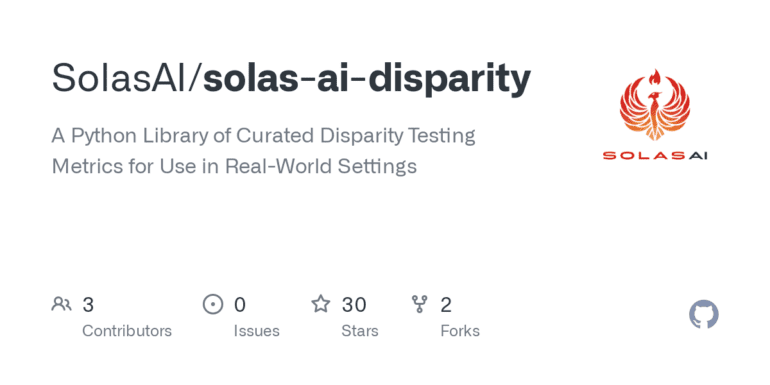TL;DR:
- SolasAI unveils an update to its Bias Explainability & Mitigation Library, reducing fairness results processing time from 48 hours to just one hour.
- The software surpasses competitors in efficiency, requiring fewer computational resources.
- Smaller businesses can now access advanced AI fairness testing, democratizing AI capabilities.
- SolasAI’s solution is particularly beneficial for companies lacking resources and expertise.
- The library empowers businesses to handle complex AI models affordably.
- SolasAI’s CEO, Larry Bradley, emphasizes its commitment to reducing discrimination across all business sizes.
Main AI News:
In a dynamic stride towards the future of ethical AI, SolasAI, the eminent purveyor of algorithmic fairness AI software, proudly introduces groundbreaking enhancements to its Bias Explainability & Mitigation Library. This momentous update, available now, ushers in a new era of AI fairness testing, drastically reducing processing time from a lengthy 48 hours to a mere one hour. SolasAI’s latest innovation cements its status as a frontrunner in the realm of efficiency and innovation in AI fairness testing.
This upgrade isn’t just about speed; it’s a leap forward in precision and resource efficiency. SolasAI has not only outshone its previous versions but also eclipsed its competitors by necessitating fewer computational resources. This achievement stems from the resolution of coding issues associated with larger datasets and significant speed enhancements. The result? Instantaneous advancements in team collaboration and effectiveness while slashing turnaround time for producing results.
Nicholas Schmidt, the Co-Founder and Chief Technology & Innovation Officer at SolasAI, articulated the significance of this development, stating, “What we’ve created in this latest update can only be replicated by top-five banks, and smaller banks and fintechs do not have the budget to do what we’ve been able to achieve. This creates a situation where smaller companies can be just as, if not more, effective than larger competition based on what’s available in the market. This is part of our vision to democratize AI and reduce bias & discrimination at all levels of business, and we’re one step closer to achieving this.”
SolasAI’s strides in AI fairness testing were fortified by rigorous private pilot testing with focus groups. These groups spanned a diverse range of businesses, from Fortune 100 healthcare and financial service giants grappling with computing power constraints to nimble AI-driven lending fintechs seeking optimized analysis to rein in cloud computing costs and support legacy environments. Post-update, these groups reveled in reduced memory requirements for feature selections, unlocking faster and more robust results without the need for hardware enhancements.
Smaller businesses often grapple with two daunting challenges: resource constraints and limited access to expertise. These constraints deter them from competing with their larger counterparts effectively. In many cases, smaller companies lack the all-encompassing features or automated data curation systems required to organize their data effectively. The absence of resources to hire data and fairness experts forces them to rely on simplistic models. Some opt for outsourcing or third-party AI services, relinquishing control of their AI modeling.
Enter the Bias Explainability & Mitigation Library, SolasAI’s paid testing and mitigation tool, designed to empower smaller companies. It provides a unified, curated, and user-friendly library that enables the handling of complex AI models without a hefty investment in programming, data science, or algorithmic fairness. This transformative library also offers smaller banks, credit unions, and healthcare providers an affordable means to test and address issues with third-party models.
Larry Bradley, CEO at SolasAI, encapsulates the ethos of this endeavor, stating, “SolasAI is about innovating to help reduce discrimination for as many people as possible, and this latest update places us in the driver’s seat to lead that effort. Smaller businesses want to improve their AI efficiency but just don’t have the resources for it, and it’s not just up to the larger corporations to close the discrimination gap. We’re in it for businesses of all sizes; the more efficient we can be with our solutions, the closer we all can be toward fully democratized, responsible AI that works for real people.”
This latest product update underscores SolasAI’s unwavering commitment to innovation and continuous improvement as AI’s capabilities and significance continue to evolve. In June, SolasAI introduced an integration that rigorously tests for algorithmic unfairness using metrics aligned with New York City’s Local Law 144 of 2021 (“NYC 144”). This law mandates companies to conduct bias audits on automated employment decision tools and disclose these findings to ensure fairness for applicants and regulate reliance on AI tools in hiring decisions.
The Bias Explainability & Mitigation Library is not merely a diagnostic tool. It excels in identifying the type and scale of algorithmic issues, elucidating their origins, swiftly exploring high-quality, low-disparity alternatives, and generating comprehensive reports. Companies embarking on their SolasAI journey can commence with the free Disparity & Bias Testing Library, which serves as a preliminary step in detecting the type and scale of the problem before seeking consultation. With SolasAI, ethical AI is no longer a distant goal but a tangible reality for businesses of all sizes.
Conclusion:
SolasAI’s latest innovation in AI fairness testing, with its remarkable reduction in processing time and resource requirements, is a game-changer for businesses of all sizes. Smaller companies can now compete effectively, democratizing responsible AI in the market. SolasAI’s commitment to ethical AI aligns with regulatory requirements, positioning it as a leader in the field and offering comprehensive solutions to meet the evolving needs of businesses.

